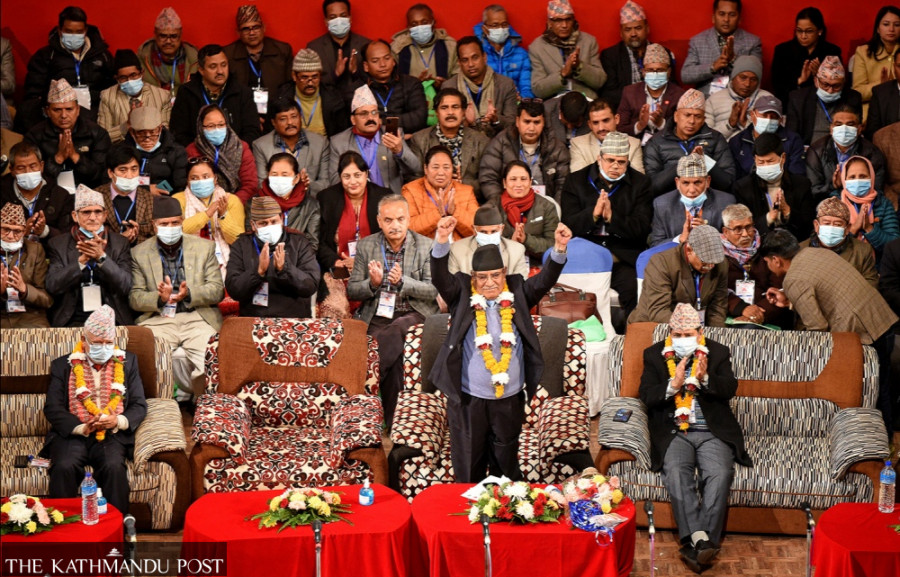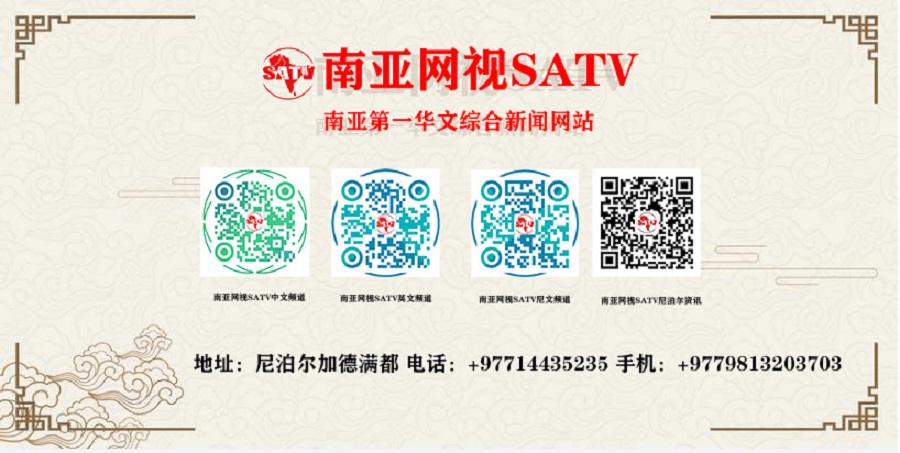
The Communist Party of Nepal (Maoist Centre) on Monday formed 25 groups to discuss the political document presented by party chair Pushpa Kamal Dahal. But the delegates found themselves at their wit’s end.
They were faced with an intriguing question—how to hold a discussion on something which was not in their hands?
Earlier on Monday, Dahal read out his political document titled “Nepal’s Road to Socialism in the 21st Century.” Delegates, a total of 1,631 from across the country, were expecting the party to distribute the copies of the document—as has been the practice.
But the party did not.
Dahal’s political document is of immense interest not only for the delegates and party members but also for observers and analysts as well as those who keenly follow politics, and journalists.
“We will discuss the document and print it in a book format after concluding our discussions. Then you all will get it,” Krishna Bahadur Mahara, party spokesperson and the coordinator of the seven-member presidium that was formed on Monday to conduct the closed session, told the media earlier in the afternoon.
The Maoist Centre started its eighth national convention, initially called the “first historic national conference”, on Sunday.
In the Maoist party, the political document presented by the chairman defines the course for the organisation.
“I was eagerly waiting for our chair’s political document. All of us want to know how the chairman wants to steer the party,” said Devendra Sunar, a youth leader who has come to Kathmandu from Syangja. “I don’t know why the party is trying to keep the chairman’s document a secret.”
The Maoist Centre is organising the eighth convention with an aim to develop a “new revolutionary thought” and build a “revolutionary party,” with the realisation that the party over the years has lost its radical zeal and become like any other parliamentary force in the country.
“How our party reinvents itself largely depends on what our chairman has prescribed in his document,” Sunar told the Post. “A thorough debate on the document would have helped the convention arrive at a conclusion on our guiding principle.”
The Maoist party was formed in 1995, but over the years it has changed its name multiple times to have the current name—Communist Party of Nepal (Maoist Centre). The party has all along followed Marxism-Leninism-Maoism. It launched “people’s war” in February 1996. In 2001, the party adopted “Prachanda Path,” contextualizing Marxism-Leninism-Maoism in Nepal for a revolution, advocating a combination of armed mass revolt and “people’s war.”
In 2006, the party laid down arms following a peace deal and joined mainstream politics. It then decided to shed “Prachanda Path.” But it has remained confused about its ideology.
The seventh convention in 2013 decided to adopt “capitalist revolution to create the foundation for socialism” as its principle. But leaders say no sincere efforts were made to implement that.
Now, as the party is holding its general convention, it aims to find a new guiding principle.
But when the political document is not available, discussions are not possible, say leaders.
Chakrapani Khanal, a Standing Committee member, said the chairman has presented a number of political documents in the past and they used to be available well in advance, if not months before then definitely weeks before the convention.
He believes the political document may not have been distributed in advance also because the party initially planned to hold a “conference” and not a “convention.”
“In our group also delegates were wondering why the document was not provided to them,” Khanal, a deputy commander during the “people’s war,”
told the Post. “Of course there was displeasure among the delegates, as they were confused.”
The 25 groups are set to sit down at 11am on Tuesday to study the political document.
According to a delegate, each group has a copy of the document. In each group, there are 65 delegates.
During previous conventions and other national gatherings, Dahal used to float his political documents among the top leaders well in advance so that point-wise discussions could take place.
According to Mahara, Dahal has proposed “continuous and well-managed peaceful revolution” and that the party would be accountable to labourers.
“Socialism is possible through peaceful revolution. We are committed to proletariats… and a continuous and managed revolution is going on. We must safeguard national independence and remain accountable to the people, especially labourers,” Mahara summed up the conclusion of Dahal’s political document, at the media briefing.
For Dahal, who has been the uncontested leader of the party for over three decades, the ongoing convention comes with some challenges.
He has already been facing charges of deviating from the core ideology and leaving the “people’s war” that set the ground for making Nepal a secular federal republic.
He is also accused of not grooming leadership and not being able to guide his party—ideologically and on other fronts.
His extravagant lifestyle also has become a topic of discussion among party members, but only a handful of them have dared to speak out.
Dahal on Monday admitted that Maoist leaders need to change their existing lifestyles to bring about a cultural transformation. “Now cultural transformation is needed and that should begin from ourselves,” a leader quoted Dahal as saying. “The lifestyles and culture of the leaders and cadres do not match the political line of our party.”
Lekhnath Neupane, a Central Committee member, said probably the leadership does not want the political proposal to be discussed on a wider level.
“Actually I had advised Dahal to organise a workshop or seminar on at least 10 crucial issues of our society before he started drafting his political document,” Neupane told the Post on Sunday. “He had told me that it was a very good idea. But he didn’t do so.”
According to Neupane, a wider participation of people from different walks of life would have helped the party find out where it had faulted and how the party could move forward.
“There’s no denying that we need to do introspection, but we also need to know how people, the society and thinkers perceive us,” said Neupane. “We cannot remain in a bubble and insulated in today’s times.”
After the Nepal Communist Party (NCP), formed in May 2018 following a merger between the Maoist Centre and the CPN-UML, collapsed this March, Dahal’s struggles have doubled. He needs to guide his fractured party while he needs to make efforts to stay relevant in Nepali politics.
His party is a key coalition partner in the current government led by Nepali Congress’ Sher Bahadur Deuba.
Deuba is keen on passing a $500 million American grant, which the Maoist Centre has opposed. The grant, called the Millennium Challenge Corporation, has become a divisive issue in Nepal.
It now threatens the ruling coalition.
Dahal is well aware of the fact he is one of the prominent politicians who made the American grant a rod for his back by weaponizing it against Oli. He also knows it can break the coalition, something he does not want at this point of time.
On Sunday, while addressing the inaugural session, he appeared to be soft on the American grant, saying Nepal has for long enjoyed US assistance. He, however, charged Oli with inserting a provision of parliamentary ratification later.
While reading out his document on Monday, he said the American grant cannot be passed in its current form.
Analysts say such a vacillation is Dahal’s typical trait and that there could be something more in his document which he does not want the delegates to discuss at length. In the Maoist Centre, differing views barely get entertained, according to them.
Historically also, those who have challenged Dahal or made their own stances have been forced out of the party. The list is long, starting from Mohan Baidya, Dahal’s mentor at one point of time from whom he took over the party. Dahal’s long-time deputy who is also dubbed the ideologue of the party, Baburam Bhatttarai, severed ties with the Maoist party in less than two weeks after the promulgation of the constitution on September 20, 2015.
Dahal’s comrade-in-arms during the “people’s war,” Ram Bahadur Thapa, has joined the UML.
Observers say the Maoist Centre was on a slippery slope long ago, especially when it forgot the party was a movement and not yet another political outfit.
“The document should have been distributed at least one or two days before the discussions started,” said Hari Roka, a political economist. “Behind the delay in distribution, there could be a motive of restricting differing views.”













